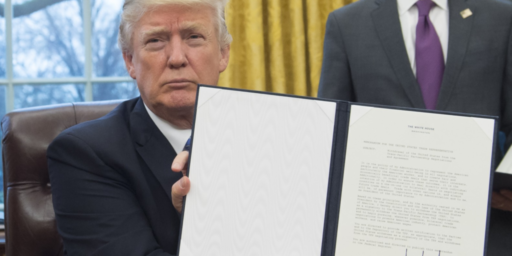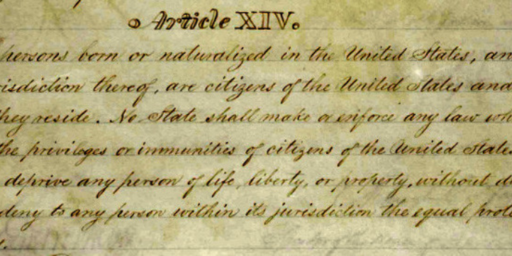More Talk of 14th Amendment Reform
The author of AZ's SB1070 has a new idea.
 Via The Lookout: 14 states may target birthright citizenship
Via The Lookout: 14 states may target birthright citizenship
Arizona state politicians will introduce model legislation this week to encourage states to prevent children of illegal immigrants from being granted citizenship under the 14th Amendment.
[…]
Arizona state Senator Russell Pearce will unveil the bill Jan. 5 in Washington, D.C., the Arizona Capital Times reports. The paper says lawmakers in Alabama, Arizona, Delaware, Idaho, Indiana, Michigan, Mississippi, Montana, Nebraska, New Hampshire, Oklahoma, Pennsylvania, Texas and Utah have said they want to introduce similar legislation this year.
Of course, introducing legislation and passing legislation are two different things (although one suspect that in AZ, and elsewhere, the bill has a chance). Further, state legislatures passing statements about the 14th Amendment and getting either the Supreme Court to agree and/or actually amending the Constitution itself is yet another.
It is unclear from the cited above report (or, for that matter, the piece in the Arizona Capital Times, Date set for unveiling of birthright citizenship bill) as to how this legislation is supposed to accomplish its goals.
The legislator in question is also the author of the now famous SB10170.
One thought occurs (and one grants a lack of full information): while one can make an argument that the states have a legitimate right to identify persons illegally in their state, even if the law being transgressed is a federal one (as per SB1070), it strikes me as yet another for a state legislature to try to alter the understanding of the federal constitution via legislation. Now, states legislatures can attempt to call a convention on a constitutional matter, but it is wholly unclear to me how passing legislation, model or otherwise, would have any standing in such a conversation.






“Arizona state politicians will introduce model legislation this week to encourage states to prevent children of illegal immigrants from being granted citizenship under the 14th Amendment.”
On it’s face that is the most non of nonstarters:
Empty grandstanding.
This also leads to a weird position where people could be considered natural born citizens in some states and illegal aliens in others. What happens if such a person gets arrested?
Besides, there’s this to overcome: United States v. Wong Kim Ark (169 U.S. 649). As Italian immigrants say, “Fette cinza”.
This also leads to a weird position where people could be considered natural born citizens in some states and illegal aliens in others. What happens if such a person gets arrested?
Then comes the Fugitive Immigrant Act.
Heh, and this time the Underground Railroad runs North to South…
The Constitution and its’ amendments are the law of the land. You cannot change anything in it without a new amendment! State Legislation does not override it. It is up to the people to amend
it if they so chose. So why don’t we get our congressional representatives to put forth an amendment if we want one. Not that they would, but then if enough of us want it, we can vote them out next election. By the way, children of foreign diplomats do not become citizens if they are born in the US.
Why not just reform immigration laws so that “anchor babies” can’t sponsor family members for citizenship or residency? This would be much simpler than amending the Constitution, would likely reduce somewhat the incentive for foreigners to have children in the U.S., and would curtail (legal) immigration. I think immigration policy should focus less on family reunification and more on encouraging those with desired skills and educations to immigrate to the U.S.
As I understand the process, a child cannot sponsor a parent until the child is 21 years of age. That’s a rather long-term strategy, so to speak. It certainly doesn’t strike me as much an incentive to have a baby in the US in the hopes that maybe, decades later, that child will sponsor you. It is further worth noting that that process is neither automatic nor quick.
NoZe, such a law has been presented to Congress; it can’t get the votes, or perhaps can’t break a filibuster.
I see the logic of it.
Courts will likely strike down any such ‘interpretation’. This provides fuel for the flamethrowers who will call for a Constitutional Amendment in order to override the unelected courts’ thwarting of the popular will. Whether they can gain the support of sufficient state legislatures is another issue, however.